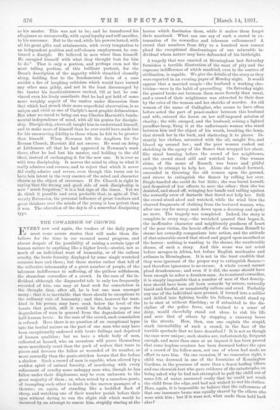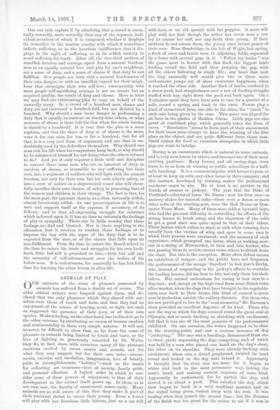THE COWARDICE OF CROWDS.
'EVERY now and again, the readers of the daily papers must come across stories that will make them dis- believe for the time in our vaunted moral progress, and almost despair of the possibility of raising a certain type of human nature to anything like a higher level;—storieri, not so much of an individual want of humanity, or of the callous cruelty, the brute ferocity, displayed by some single wretched creature here and there; but those stories rather that tell of the collective inhumanity of a great number of people, of the inhuman indifference to suffering, of the pitiless selfishness, the shameless cowardice of a crowd. In the case of the in- dividual, although the disgraceful tale is only too frequently recorded of him, one may at least seek for consolation in the thought that, after all, he is but one man amongst many ; that it is inevitable that there should be exceptions to the ordinary rule of humanity ; and that, however far man- kind in his person may have sunk below the level of the beasts that perish, still it would be foolish to argue the degradation of man in general from the degradation of one half-human brute. In the case of the crowd, such consolation is refused. Here there is no question of an exceptional lapse into the bestial nature on the part of one man who may have been exceptionally endowed with brute failings and deprived of human qualities; but we have a whole body of men, collected at hazard, who on occasions will prove themselves more mercilessly cruel than the pack of wolves that tears to pieces and devours the fallen or wounded of its number, or more cowardly than the panic-stricken horses that flee before a shadow. Such a crowd of men is capable, when stirred by a sudden spirit of animal ferocity, of murdering with every refinement of cruelty some unhappy man who, though he has fallen under their displeasure, may be even unknown to the great majority of them ; or, when seized by a causeless panic, of trampling each other to death in the narrow passages of a theatre ; or, again, of standing like a huddled flock of sheep, and watching one of their number perish before their eyes without daring to run the slight risk which would be incurred by an attempt to rescue him, stupidly staring at the
horror which fascinates them, while it makes them forget their manhood. What can one say of such a crowd in ex- tenuation of its cowardice and inhuman callousness? A crowd that numbers from fifty to a hundred men cannot plead the exceptional disadvantages of one miserable in- dividual whom nature may have defrauded of his birthright.
A tragedy that was enacted at Birmingham last Saturday furnishes a terrible illustration of the want of pity and the supreme indifference of which mankind, even in the centres of civilisation, is capable. We give the details of the story as they were reported in an evening paper of Monday night. It would appear that a married couple—the husband a working elec- trician—were in the habit of quarrelling. On Saturday night the quarrel broke out between them more fiercely than usual, and a crowd of their neighbours was attracted to their door by the cries of the woman and her shrieks of murder. An old woman of the name of Gallagher, who seems to have often before acted the part of peace-maker between this husband and wife, entered the house on her self-imposed mission of charity; the wife escaped, and the husband, seizing a lighted paraffine-lamp, flung it at the unfortunate woman who stood between him and the object of his wrath, breaking the lamp, that struck her in the back, and shattering it to pieces. In- stantly her clothes, saturated with the oil, caught fire, and blazed up around her ; and the poor woman rushed out shrieking in the agony of the flames that wrapped her about. She stood burning before the crowd of her neighbours, and the crowd stood still and watched her. One woman alone, of the name of Russell, was brave and pitiful enough to attempt to help her. Alone she rushed forward, succeeded in throwing the old woman upon the ground, and strove to extinguish the flames by rolling her over. Single-handed she could do but little ; she was burnt herself, and despaired of her efforts to save the other : then she too desisted, and stood off, wringing her hands and railing against the cowardly crew of dastards that dared not help her. Still the crowd stood aloof and watched, while the wind blew the charred fragments of clothing from the tortured woman, who, after one cry for mercy, sank down upon a doorstep and spoke no more. The tragedy was completed. Indeed, the story is complete in every way,—the wretched quarrel that began it, the inoffensive character and neighbourly goodness of heart of the poor victim, the heroic efforts of the woman Russell to shame her cowardly companions into action, and the attitude of that miserable crowd that stood and gaped open-mouthed at the horror : nothing is wanting to the shame, the unutterable shame, of such a story. And this scene was not acted before savages in Africa, but before English mechanics and artisans in Birmingham. It is not in the least credible that they were ignorant of the proper way to extinguish flames,— and therefore ignorance is no excuse. A whole crowd cannot plead drunkenness ; and even if it did, the scene should have been enough to sober a drunken man. As to natural cowardice, it is simply impossible that a number of men of that descrip- tion should have been all born cowards by nature, naturally timid and fearful, or unnaturally callous and cruel. Probably any one of the individual men present, if turned into a soldier and drilled into fighting beside his fellows, would stand up to be shot at without flinching; or if submitted to the dis- cipline of the police force, and trained to a sense of linty, would cheerfully stand out alone to risk his life and save that of others by stopping a runaway horse in the streets. How, then, can one explain the stupid, stark insensibility of such a crowd, in the face of the terrible spectacle that we have described P It is not as though the case were unique; such stories are, unfortunately, frequent enough, and more than once at an inquest it has been proved that some hapless creature has been drowned before the eyes of a crowd of his fellow-men, not one of whom had made an effort to save him. On one occasion, if we remember right, a child was drowned in one of the fountains of Kensington Gardens, in the presence of more than a dozen loafing idlers, and one clownish lout who gave evidence of the catastrophe, on being asked why he had not attempted to pull the child out of some 3 ft. of water, answered coolly that he could not reach the child from the edge, and had not wished to wet his clothes. Here, again, it is impossible to believe that the callousness of that one insensate brute was equally shared by the others who were with him ; but if it were not, what made them hold back also ?
One can only explain it by admitting that a crowd is essen- tially cowardly, more cowardly than any of the separate, indi- vidual members of which it is composed, whether it displays its cowardice in the wanton cruelty with which it sometimes inflicts suffering, or in the heartless indifference that it dis- plays in the sight of suffering, or in its selfish anxiety to avoid suffering for itself. After all, the two chief motives of unselfish heroism and courage, apart from a natural fearless- ness or an equally natural love and pity for one's neighbour, are a sense of duty, and a sense of shame if that duty be not fulfilled. Few people are born with a natural fearlessness of their own danger, or with an unselfish regard for their neigh- bour that outweighs their own self-love; consequently, with most people self-sacrificing courage is not an innate but an acquired quality, the result of duty and shame. Here at least we may find one extenuating plea to urge on behalf of the cowardly many. In a crowd of a hundred men, shame and duty are not increased a hundred-fold, but are divided by a hundred. Why should a man incur danger in performing a duty that is equally incumbent on ninety-nine others, or what measure of shame is there left for him when the whole burden is shared by a hundred? It is true that the plea is a mere sophism, and that the share of duty or of shame is the same, were it for one man, for ten, or for a hundred; but, for all that, it is a very real form of argument, and one that is un- doubtedly used by the. defaulters themselves. Why should one man risk his life when his companions hang back, or why should he be ashamed of himself for not doing what the others refused to do ? And yet it only requires a little drill and discipline to convert these same men, who are so ignorant of duty, so careless of shame, so insensible to any suffering but their own, into a regiment of soldiers who will fight with the utmost heroism, not only for their own but for each other's safety, or into a crew of sailors on a shipwrecked vessel who will cheer- fully sacrifice their own chance of safety in procuring that of the women and children in their charge. The fact is that, for the most part, the ignorant class is, as a class, naturally selfish, almost ferociously selfish : its one preoccupation in life is to save and support itself at the expense, if necessary, of its fellows ; and in that all-engrossing struggle for existence which is forced upon it, it has no time to entertain the feelings of pity or sympathy. There can be little wonder that those feelings are dull and blunted. Nor is there anything in the education that it receives to awaken those feelings, or to impress the boy with the sense of the duty that is to be .expected from the man, or of the shame that falls upon its non-fulfilment. From the time he enters the Board school to the time he enters his trade and struggles for his own liveli- hood, little but self is preached to him,—little but self and the necessity of self-advancement over the bodies of his .fellowmen. It is unfortunate, for assuredly he has but little time for learning the other lesson in after-life.



































 Previous page
Previous page